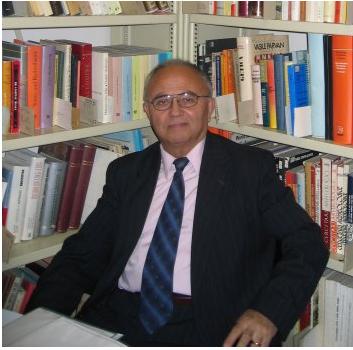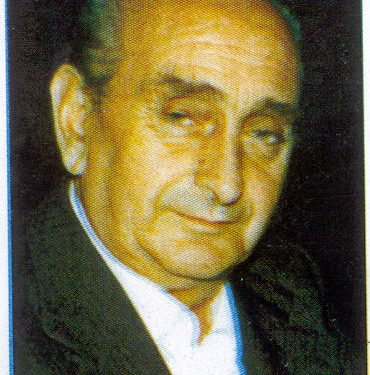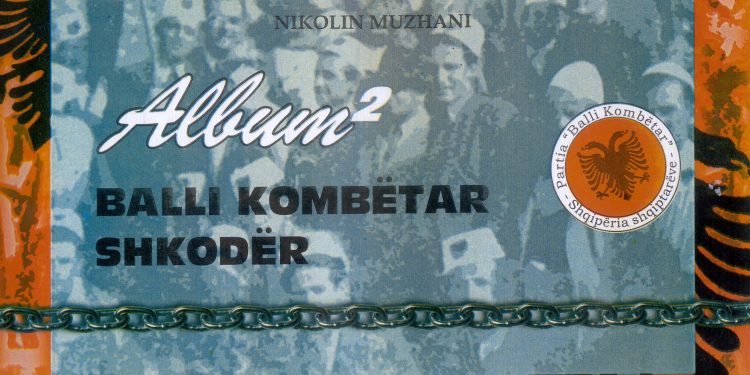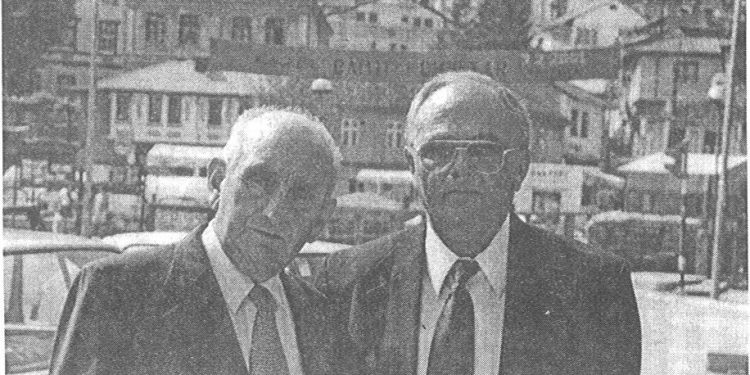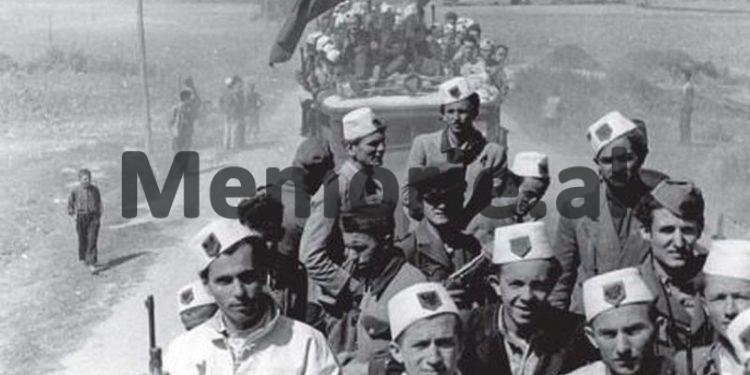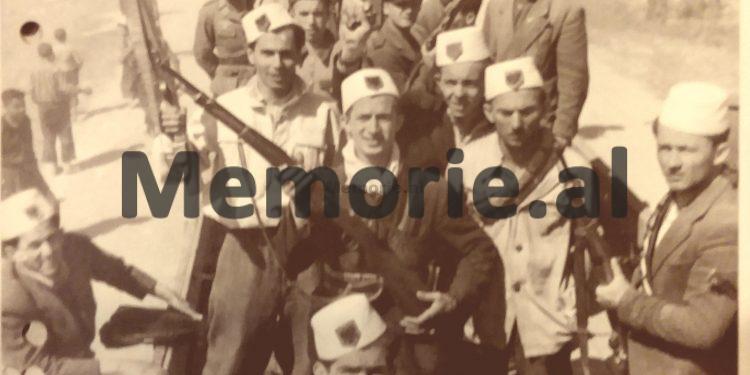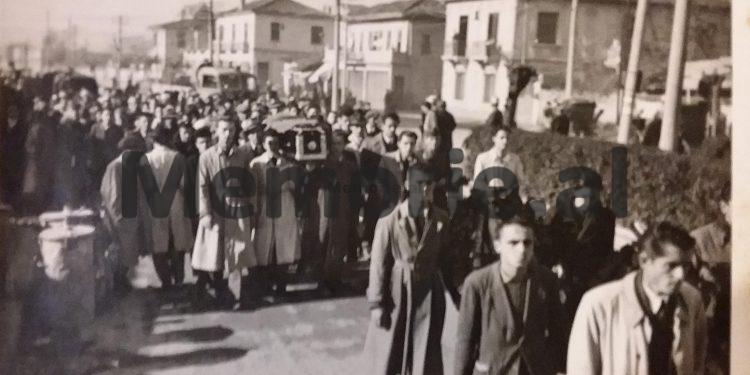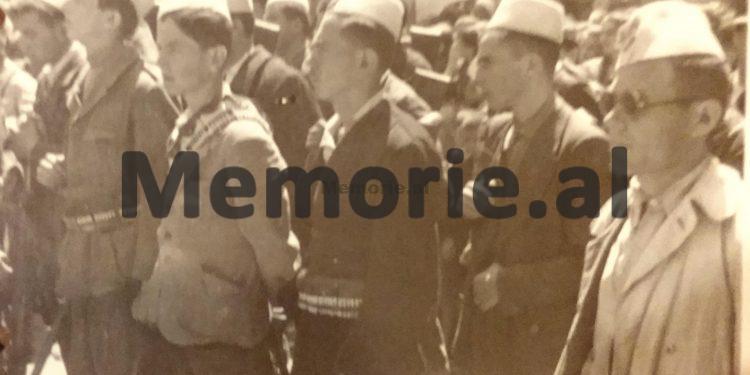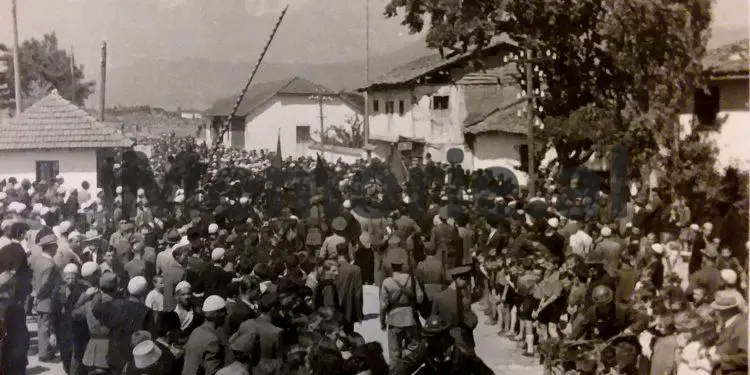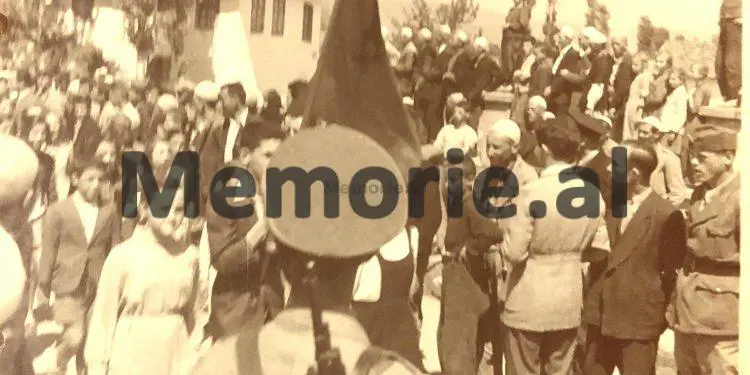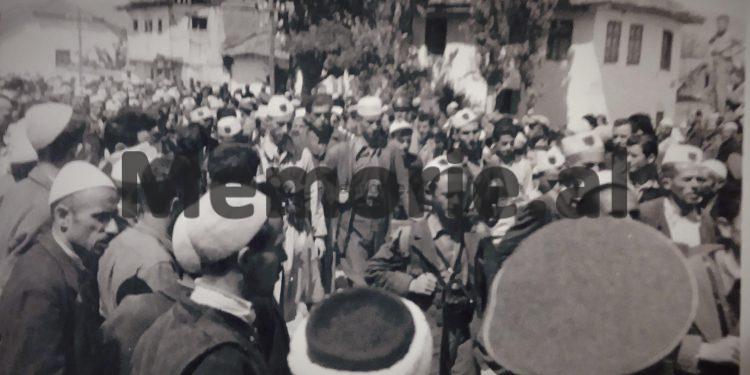Dashnor Kaloçi
Memorie.al publishes the unknown story of two Shkodra intellectuals, Nikolin Muzhani and Mentor Quku, who after the ’90s, devoted themselves to great work, collecting various materials, documents, and photographs, for the nationalist organization Balli Kombëtar and The Legality Movement, which for nearly half a century was silenced and erased from the official historiography and propaganda of Enver Hoxha’s communist regime. Nikolin Muzhani completed that colossal work with the design and publication of a luxury album entitled “Album, Balli Kombëtar Shkodër”, which was published in 2000. But in that album, which was received with great interest by the public. widely, Nikolin Muzhani claimed to remain anonymous and did not mention his name on the album cover. Nikolin Muzhani did not leave that work that started years ago in the middle, but he continued to collect various documentary materials and photographs, with the idea of publishing his second part. But he did not succeed because he passed away on June 15, 2002, and the work that Nikolini left unfinished was completed by the Shkodra branch of the Balli Kombëtar party, under the auspices of Mentor Quku, director of the Historical Museum. of Shkodra. In the publication of the second part of the album, Mentor Quku made his preface, noting the name of Nikolin Muzhani, the real author of that album, which undoubtedly, among other things, has brought to Shkodra, a part of its history. which he had lacked for half a century.
One of the most preferred methods that Enver Hoxha’s communist regime has consistently used since coming to power in December 1944 and onwards, against its two rival political forces, Legality and the National Front, has been to manipulate and falsify history. After December 1944, when the “triumphant” communists closed the chapter of the armed struggle against the ballists and legalists, they continued the propaganda war against them, engaging the entire state arsenal at the disposal of the ruling regime.
In this propaganda war against their former rivals, the Communists took care to erase once and for all the historical memory, everything related to those two political forces, starting from the war waged by the Ballists and legalists against the Nazi occupiers, etc. In this context, it was also the care shown by the communists to seize or rob all the documents, manuscripts, photographs, or various materials of archival and historical value, of all the families or special persons who were hit by them by arresting them. , imprisoned, exiled, and shot. The communists were so careful in that “working method” that not a single man can be found to prove that he was arrested on political charges during the communist regime of Enver Hoxha and that he was not searched. , for the seizure of documents and photographs at his disposal. By seizing photographs, especially those of historical character, the communist regime intended to erase from the collective memory all the war that the Ballistas and Zogists had waged, and not to leave a single photograph of a document that could prove it. which they had also erased from official history and various books.
In this propaganda war, the Communists almost succeeded, and throughout the nearly half-century of their rule, not only were no photographs of ballistic or Zogist bands published in history books or in various newspapers and magazines. but also the holding of such a photograph by any person was very dangerous and finding it costing several years in prison. Given this fact, most of the “reactionary” families, who were hit by the communist regime and ended up in prisons or internments, took care to hide from the face of the earth various documents, manuscripts, and family photos, hiding them. they in the most incredible ways and another part to save the head, destroyed them by burning them.
Only after the ’90s, with the collapse of the communist regime of Enver Hoxha, it became possible to bring to light a part of the missing history of the Albanian people, part of which were undoubtedly the two political forces, Legality, and National Front. In addition to the numerous historical documents available from the state archives, for those two political forces, a large number of documents released and stored for several decades by those families or persons considered as enemies of the government came to light. popular. One of those people who researched and collected various historical documents and photographs was the Shkodra intellectual, Nikolin Muzhani, whose family was involved and hit in the most barbaric way by the whirlwind of class warfare. For nearly ten years, from 1991 to 2001, Nikolin Muzhani focused his work on collecting various historical documents and photographs, showing the political organization of the National Front and in particular that of the Shkodra branch, which he concretized with the collection of dozens and dozens of photographs, which best reflected the living history of that nationalist organization, previously unknown to the general public.
Nikolin Muzhani completed that colossal work with the design and publication of a very luxurious album entitled “Album, Balli Kombëtar Shkodër”, which was published in 2000. But in that album, which was received with great interest by the public. broad, Nikolin Muzhani claimed to remain anonymous and did not mention his name on the album cover. Nikolin Muzhani did not leave that work that started years ago in the middle, but he continued to collect various documentary materials and photographs, with the idea of publishing his second part. But he failed to achieve his goal because he passed away on June 15, 2002, and the work that Nikolini left unfinished was completed by the Shkodra branch of the Balli Kombëtar party, under the auspices of Mentor Quku, the museum’s director. History of Shkodra. In the publication of the second part of the album, Mentor Quku made his preface, noting the name of Nikolin Muzhani, the real author of that album, which undoubtedly, among other things, has brought to Shkodra, a part of its history. which he had lacked for half a century.
Who was Nikolin Muzhani?
Nikolin Muzhani was born in Shkodra on December 5, 1931, in the prominent Shkodra family Muzhani. Prominent figures of this family are known for their commercial activity, for maritime transport, as well as in the economic, political, and religious life of the country. Because of these activities, Nikolin’s entire family was persecuted by the communist dictatorship in the most barbaric way. Thus, that family was not only expropriated and subjected to extraordinary seizures and taxes but was also imprisoned and interned in communist camps and prisons, starting with Vittore’s mother and father, Zef Muzhani, as well as her sisters and brothers. Nicolini received his first lessons and studies until high school in his hometown of Shkodra. For political reasons, he was expelled from Albanian schools when he was in his last year of pedagogical high school in the city of Shkodra. Although he was a talented man and as a self-taught man he gained a wide culture, he was forced to work in agricultural enterprises, in construction sites, in the hydroelectric power plant of Ulza, in the construction site of the Superphosphate in Laç, etc. He then worked as a laborer in the city of Durrës, where he received his high school diploma, which was terminated against his will.
Then, taking advantage of a “class war depression”, Nicolini enrolled in the branch of Mechanical Engineering at the University of Tirana, where he also took exams for the first two years, but then was expelled from there due to his biography… Recently he served in the Trade Park in Shkodra, where he worked as an electro-auto master. Equipped with Christian education and with a strong will and character, he engaged in political life in the transition period after the ‘90s, joining the right-wing of the Albanian political spectrum. He was a member of the “Balli Kombëtar” party since the beginning of its re-establishment, militating in the Shkodra Branch. He also participated as a delegate in the Eighth Congress of the Balli Kombëtar Party, held in Tirana on May 16-17, 1993, as well as in the 9th Congress held in Tirana on May 31 and June 1. 1998. Throughout that time he made an outstanding contribution by being elected to the highest positions of this party.
Although seriously ill, Nicolini did not retire for a moment, until he passed away, performing with courage and professionalism his high duties, as a Member of the National Council of the “Balli Kombëtar” Party, Member of the Presidency of the Shkodra Branch of this Party, where she also served as its Organizational Secretary. He also made a significant contribution to the organization of the party structures “Balli Kombëtar” not only in Shkodra but also in the branches of Tropoja, Has, Kukes, Mirdita, Lezha, Malësia e Madhe, as well as in Kosovo. Nikolin Muzhani passed away on June 15, 2002, in his hometown, in the city of Shkodra, and the work, the three illustrated albums that were published, are the fruit of his knowledge and passion for the history of Albania, as well as his commitment. that he had for tracing the documents of the history of the “National Front” of the period of the Second World War. In addition, Nicholas left many other manuscripts of considerable interest.
Mentor Quku: Here are the values of the album
Nikolin Muzhani’s second album, which he was not lucky enough to see published, has a preface by Mentor Quku, director of the Historical Museum of Shkodra, who, among other things, was one of the people who has helped Muzhan more in his work. In that preface, Mentor Quku, (who also passed away in 2014), wrote, among other things: “I have a special pleasure today to see one of the most ambitious plans of the party enter the path of realization.”Balli Kombëtar”, Shkodra Branch, that of publishing works with the historical character of “Balli Kombëtar”. This branch, being at the forefront of the movement for the strengthening and modernization of the “Balli Kombëtar” party, rightly has to be proud of the numerous publications it has made in the direction of illuminating its history during the years of World War II. Here we can mention the republishing of Mit’hat Frashëri’s works “Longing” and “Our Wounds”. Also published were the album Balli Kombëtar Shkodër, the book “A new look at the War of Reçi”, as well as the reprint of the book of the researcher from Prishtina, Sabile Çekmezi (Basha), “The illegal Albanian patriotic movement in Kosovo 1945-1947”.
We are exactly on this track, now that we are publishing the second volume of the album “Balli Kombëtar” – Shkodra. It is an ambitious enterprise that is moving forward boldly and is challenging time despite all the difficulties and other obstacles. The author of this publication is the politician and historian, Nikolin Muzhani, who passed away a few days ago. The moment I am writing these lines, I feel and suffer greatly from the absence of one of my closest and most devoted collaborators, the author of this historical work, who has created a gap in the ranks of the “National Front” party… I want to conceive of this preface as a monument in memory of Nikos, my close friend, and companion. He has special merit because, although ill for eight years due to an incurable disease, he did not retire for a moment, he was working with devotion for the party of “Balli Kombëtar”, for Albania that he loved so much. In addition to being a class politician, he was a self-taught scholar of our national history. He had inherited a rich library which he had enriched himself. Equipped with a natural intelligence as well as with interests in the history of the nation, he on various occasions elaborated historical statements and works, which were distinguished for their seriousness. In this regard, it is of interest for him to hold papers at scientific seminars. Recently, he delivered a very interesting speech at the seminar organized by the Albanological Institute of Prishtina, on the occasion of the 62nd anniversary of the founding of the “Balli Kombëtar” Party. His historical works were the fruit of his passion for the history of the nation and especially for the correction of the great injustices done to the history of the “National Front”, as well as the extensive knowledge of his research activity in the archives and family of documents. of various materials.
It is precisely the result of this serious commitment of Nikolin Muzhani, the publication of this second issue of the album “Balli Kombëtar” Shkodra. Nikolin Muzhani is also the creator of the first album of this series, but his wish was to remain anonymous because it was in his nature to work without being proud of his contributions. This time we, his friends and associates, have a duty to make sure that his work is really represented as it really is. Taking over the publication of this work, we carry out the trust of our dear friend Nikolin Muzhani. We promise to continue this serial publication. We will not allow the work of our friend to remain halfway. The call made by the author of this work in the preface of the first issue on April 25, 2000, to all readers to help enrich the Album with new and unknown documents gave its results. The author received a lot of photographic materials and documents, “Ballit Kombëtar” magazines of the war, diaspora materials, etc. Some of them, the author of the album, included in this new edition.
We mention the rare and precious photos donated by the ballista from Përmet, Hasan Ismail Sakollari, who brought them from the land where he kept them wrapped in plasma, photos by Xhemal Alimehmeti from Tirana, by Tanush Mulleti, by Shkëlqim Vogli from Kavaja, etc. Of particular interest are the photographs that Hasan Ismail Sakollari has preserved from the communist dictatorship. These are photos that have been in demand for a long time in Shkodra by the author, which with great perseverance he managed to discover in the nationalist families of Përmet. It is about the photos of the delegates of the governor of Shkodra in the Congress of “Balli Kombëtar” in Berat on January 3-6, 1944. There are also some rare photos of the ballistic detachments of Shkodra, during the Second World War. I would like to thank Mr. Isa Sekni, Basri Elezi, Hadi Bushati, Sadetin Kopliku, Ermal Dervishi, etc., for the help they have given in finding the photos and providing the information that made possible the publication of this album. They are concrete evidence that proves the opposite of what historians such as Xhemil Frashëri have written for 50 years, stigmatizing the “National Ball” by order of Enver Hoxha and Yugoslav emissaries.
Their help takes on a special meaning, today when pseudo-historians like Xhelal Gjeçov are rushing to publish their “new” version of the history of the Albanian people, with the aim of cementing, with some stucco, their version. longtime Marxist-Leninist. But on the other hand, a new generation of historians and scholars is being born, who, by digging in the archives, are discovering documents on the basis of which they are writing the historical truth of Albania. There is even a group of historians in academic circles, such as Professors Sherif Delvina, Muharrem Dezhgiu, Beqir Meta, etc., who are objectively writing important works that show the truth of the distorted history of World War II in Albania. These historians are boldly telling the truth about Albanian nationalism, calling for an Albanian national state. They have shown with historical facts that Albanians have never been aggressors and invaders of foreign lands.
Albanian nationalism has been human for centuries, showing the values of its culture and traditions. This album has been composed by the author, as a work with scientific acrobatics, dominated by clear explanations and drums that have been collected with patience and courage. It somehow complements the first issue of this series that saw the light of day two years ago. It undertakes to publish facsimiles of documents of the “Balli Kombëtar” party during the war. We see fit the author’s plan to make room, at the end of the Album, a separate chapter with photographs and documents that have no direct connection with the history of the “National Front” of Shkodra. The author’s goal has been to harass and employ other branches with historical traditions for the “National Ball”, such as Tirana, Kavaja, Vlora, Librazhd, Elbasan, Tropoja, Gjirokastra, etc. The author also aimed to continue the work launched in the diaspora for party documents and press releases. This mixed chapter also includes a document that talks about the attempt to keep the Balli Kombëtar party afloat in the Upper Curraj of Tropoja in the 1960s. We invite those who have the opportunity to help with photos and documents, to make possible the publication of other issues of this series “, it is said in the preface of Muzhan’s album, by his close collaborator, Mentor Quku.
The idea for the album
While in the preface of the other album, prepared by the branch of the Balli Kombëtar party of Shkodra, it is stated. Since then, neo-communist propaganda has launched the idea that there was no tradition of the National Front in Shkodra. The communist dictatorship killed, imprisoned, deported, and expropriated the Ballists. Through the war of classes, pogroms, raids, he discovered, disappeared, and seized many of the documents, photographs, and material facts that proved the history of the National Ball of Shkodra. Some ballistas emigrated to avoid a civil war. Some were tortured in 24 famous State Security prisons, which operated only in the city of Shkodra. Thus, the ballistas of Shkodra at the beginning of the years of democracy happened without their history, without the archives, without documents of their truth, they happened in front of history and literature full of deception.
Fighting, expropriated, and persecuted, the Ballists came under pressure from neo-communists led by anti-national strategist Ramiz Alia, who declared: “We cannot allow the Balli Kombëtar and Legaliteti party. We will eat grass and shed blood, and we will not allow that. ” In the efforts of the Balli Kombëtar of Shkodra, for its political identity, to work for the organization and modernization of itself as a flexible party, which tries to improve the difficult situation where the country is immersed, the propaganda department has worked patiently to collect documents, photographs, as well as other material values collected and carefully preserved by the ballistas, have tried to reconstruct the structures and history of Balli Kombëtar. This album tries to present a part of the identity and history of the ballistas of Shkodra. Balli Kombëtar was established in Shkodra on August 31, 1939. It was a pluralistic organization whose founders were intellectuals with democratic ideas and patriotic feelings. The Ballists from Shkodra were an organization and active participant in all demonstrations, they were at the forefront of the resistance against the foreign invaders.
It is significant that while the rifle was fired, amid enemy bullets, near the mortally wounded body of the communist Vaso Kadia, it was the ballist Zef Staku, along with the communist Reshit Rusi, who sent him to the hospital. The largest anti-fascist demonstration in Shkodra was that of July 26, 1943, led by the Ballists and the chairman of the Balli Kombëtar Youth, Professor Mustafë Dervishi. Just because the head of the Balli Youth, Professor Mustafë Dervishi, was killed there, she was not mentioned at all in the communist press. The greatest cynicism was that even if in any case it was written about, it was said that in this demonstration “some ballistas were killed.” No SNP document, no communist tract of the time spoke about this demonstration, while Balli brought out the tract within a day as well as in the six months of the assassination. Balli Kombëtar also placed a memorial plaque which the communists smashed. For the Reçi war, which took place on August 30-31, 1943, where the main battle was fought by the ballistic detachments commanded by Jup Kazazi, the forces of the national army of Ulcinj led by the leaders of the National Front Fuat Dibra, Zenel Kazazi, the legalist forces as well as popular detachments, no words were said from the communist press of the time, no words from the chronicles of the time, no tract. While Balli Kombëtar immediately published the report in its clandestine press of the time.
The Reich War was later taken over by the Communists, who, through their historiographers, called it the work of the partisans alone. They either denied the role of Jup Kazazi in the Rec War or portrayed him as an accomplice of the occupier. We are quoting a part of the reserve letter of September 3, 1943. where the Prefecture of Shkodra reported to the political office of the Ministry of Internal Affairs with the letter reserves 396/4 (AQSH, Film 1870, no. 4): “We have the honor to inform you that the army’s operations against Jup Kazazi’s rebel detachments with comrades began on the 30th of last month at 4 am and the army withdrew on 31.8.1943 ”. Throughout the text of this report of the time, not a word is said about the partisans’ war against the army. The report of the Balli Kombëtar District for the Reçi War submitted to the press explains that the ballistic forces led by the legendary hero Jup Kazazi did not cooperate with the occupying forces, nor did they betray the partisan forces, but instead fought selflessly by carrying the main weight of the war. In the war chronicles published by “Zeri i Popullit”, the War of Reçi is not mentioned, while when we have published the summary chronicles of August-September 1943. Only in Dukagjini, there were three battalions of Balli Kombëtar commanded by Mark Sadiku, Ndue Paul, and Peter Mehmet Shpendi.
As the Communists went to Kosovo to suppress the national movement to sell Kosovo to Serbia, in July 1943, the idealistic youth of the Shkodra National Front went to Kosovo to fight Serb-Montenegrin Chetniks. The publication of this album is the first proof to present those men, boys, and nationalist girls from Shkodra who worked with dedication for the liberation of the country, regardless of province, religion or idea. These documents are just small particles that have escaped the savage storm of time, as well as class warfare. The leadership of Balli Kombëtar, Shkodra branch, apologizes for the shortcomings of this album, for reasons that do not depend on us. For many people and events, Balli Kombëtar is looking for scientific data, documents, and photos that will take place in the reprint of this album. We hope that we will fill the gaps with the commitment of all those for whom the cause of the National Front is dear. All those who will read this album are invited and who have the opportunity to help for its enrichment or publication, to get in touch with the leadership of Balli Kombëtar in Shkodra ”./Memorie.al




